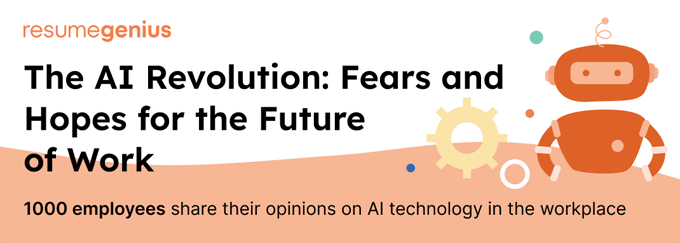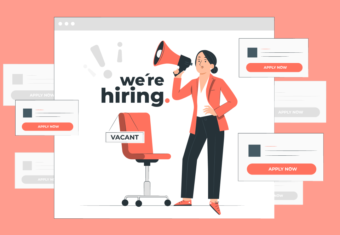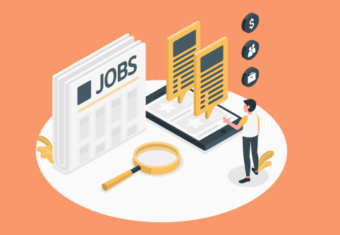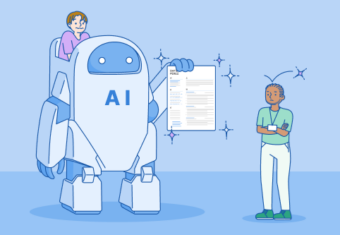NOTE: This page is regularly updated to include new data and best reflect current hiring trends. We outline our methodology and provide a bit of context about who we are at the end of the survey.
The popularity of ChatGPT and other generative AI applications has grown rapidly in recent months. But not everyone is convinced they’re the future of work. While some view them as a chance to take their career to the next level, others worry about losing their job.
Recent statistics show that:
- artificial intelligence capabilities, such as natural language generation, have doubled since 2018. (McKinsey & Company)
- by the mid-2030s, one-third of all employment could be automated. (PwC)
- 64% of respondents would trust a robot more than their manager. (Oracle & Future Workplace)
To build upon this research, Resume Genius surveyed 1000 employees to examine cutting-edge issues such as:
- Attitudes and feelings toward AI at work
- Influence of AI on the labor market
- First-hand experience with AI in the workplace
- Using AI for recruiting
- The role of AI in job hunting
- Predictions for the future
- General opinions on AI
Our findings show that many workers have concerns about the impact of AI on the job market:
- 69% of workers fear losing their job due to the growth of AI.
- 74% predict that AI technology will make human workers obsolete.
- 37% believe AI will reduce the number of job opportunities.
- IT, manufacturing, and health care are the industries considered most at risk of being replaced by AI technology.
But many also see the potential advantages of artificial intelligence:
- 82% have tried ChatGPT or other AI programs for work purposes.
- 25% are willing to interact with AI in their workplace instead of humans.
- 86% think that using AI by employers can enhance the recruitment process.
- 73% claim AI can prevent discrimination and unequal treatment of workers in recruiting.
Keep reading to learn more about American workers’ opinions on how AI will impact the workplace.
Attitudes toward AI in the workplace
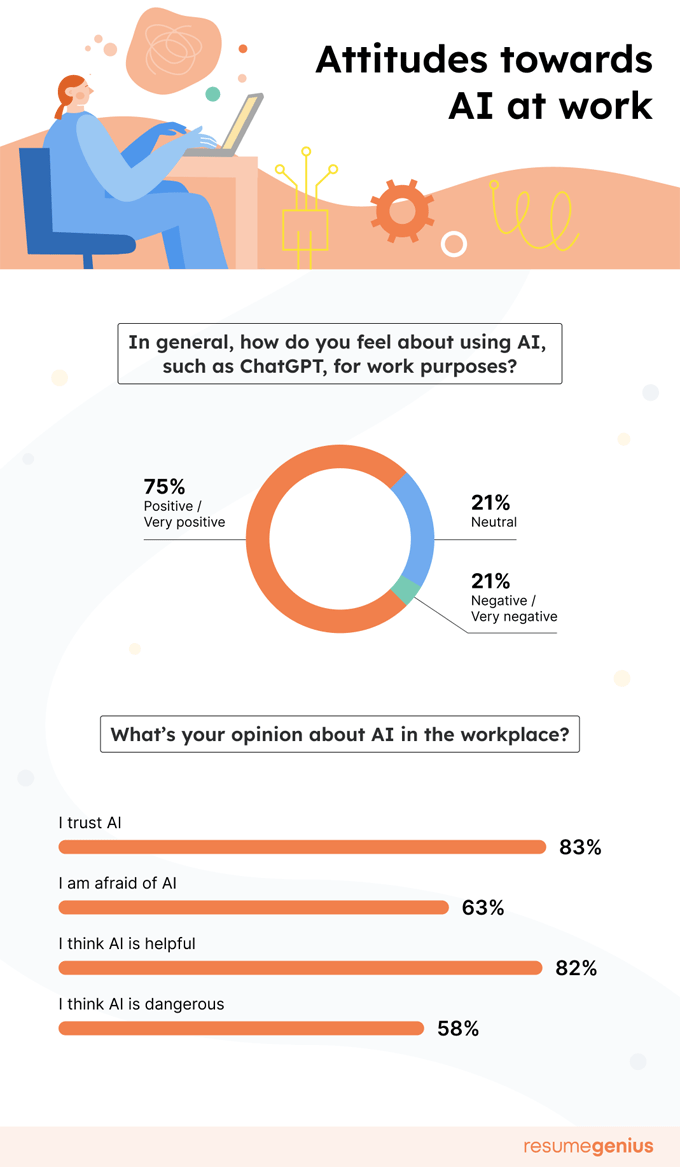
To begin with, we examined how respondents felt in general about using AI, such as ChatGPT, for work purposes.
- 75% were positive about using AI at work, 21% remained neutral, and only 4% viewed it negatively.
- The most enthusiastic group of participants were those who described themselves as white and blue-collar hybrid workers (94%).
- Master’s degree holders showed a much more positive attitude toward AI technology in the workplace than respondents with no college degree – 80% vs. 55%, respectively.
Do you trust AI?
Digging deeper, we asked a series of more detailed questions reflecting participants’ attitudes toward AI in the workplace. Below, you can see statements and the percentage of survey takers who agreed with them.
I trust AI – 83%
- Gender: females—85% vs. males—81%
- Industry: manufacturing—90% vs. business & finance—76%
- Form of work: on-site—85% vs. remotely—76%
- Annual income: $75,000 and greater—87% vs. $25,000 and less—75%
- Political affiliation: Democrats—90% vs. Republicans—74%
I am afraid of AI – 63%
- Age: 26–40—72% vs. 25 or younger—54%
- Industry: business & finance—69% vs. software/IT—59%
- Company size: 1–50 employees—73% vs. 501+ employees—58%
I think AI is helpful – 82%
- Age: 41 or older—84% vs. 25 or younger—75%
- Ethnicity: white—83% vs. ethnic minorities—73%
- Industry: manufacturing—87% health care—74%
- Company size: 501+ employees—89% vs. 1–50 employees—78%
- Work experience: 11+ years—88% vs. 3–5 years—75%
- Education: Master’s degree—88% vs. no college degree—67%
- Political affiliation: Democrats—87% vs. Republicans—73%
I think AI is dangerous – 58%
Some other findings to mention here:
- Participants with no college degree (65%) showed noticeably less trust in AI, compared to other demographics.
- Ethnic minorities (68%), employees working remotely (66%), and respondents earning less than $25,000 (65%) were most likely to consider AI dangerous.
Let’s take a closer look at the influence of AI on the labor market.
Will robots take our jobs?

The current explosion in AI technology evokes mixed feelings, from enthusiasm to fear.
69% of respondents claimed they were afraid of losing their job due to the growth of AI.
- Gender: males—74% vs. females—65%
- Ethnicity: ethnic minorities—84% vs. white—67%
- Industry: business & finances—71% vs. manufacturing—63%
- Company size: 1–50 employees—77% vs. 201–500 employees—58%
- Work experience: 1–2 years—80% vs. 6–10 years—58%
What jobs will be replaced by AI?
We also asked participants what industries, in their opinion, were most at risk of being replaced by AI technology. They could choose up to 3 sectors. The answers were the following:
- IT – 46%
- Manufacturing – 31%
- Health care – 27%
- Business and finance – 24%
- Science – 24%
- Media – 22%
- Education – 21%
- Transport – 20%
- Government – 15%
- Retail – 14%
- Law – 10%
- Real estate – 9%
Respondents also provided examples of jobs they believe to be threatened by AI development. The professions considered most likely to be taken over by AI were [alphabetical order]:
- Bookkeepers
- Cashiers
- Compensation and benefits managers
- Computer programmers
- Couriers
- Customer service clerks
- Data entry specialists
- Data scientists
- Digital marketers
- Drivers
- Manufacturing professionals
- Proofreaders
- Receptionists
- Software developers
- Telemarketers
- Translators & interpreters
- Web developers
Have a look at some further comments our survey takers made:
I believe that professions that are more routine-based are the most likely to be taken over by AI. This includes jobs such as customer service, data entry, bookkeeping, and other roles that require a significant amount of repetitive tasks.
Workers with lower levels of education and who perform routine tasks—think cashiers or file clerks—face the greatest risks of their jobs being automated.
Jobs that won’t be replaced by AI
On the other hand, when it came to professions considered least likely to be replaced by AI, respondents named [alphabetical order]:
- Artists
- Chefs
- Childcare specialists
- Doctors
- Engineers
- Human resources managers
- Judges
- Lawyers
- Marketing strategists
- Musicians
- Nurses
- Prosthetics
- Psychologists
- Real estate agents
- Social workers
- Teachers
- Therapists
- Writers
Our respondents also explained why they don’t think certain jobs can be completely replaced by AI:
Healthcare professionals, such as doctors, nurses, and therapists, require empathy and human interaction when caring for patients.
Creative professionals, such as artists, writers, and musicians, rely on their unique skills and imagination to produce original work.
Social workers and other professionals in the human service field require empathy and personal connection to help clients.
Teachers and trainers require the ability to adapt to individual learning styles and provide personalized feedback.
Professions that involve a high degree of creativity, social intelligence, and dexterity are less likely to be taken over by AI. These include jobs that require a deep understanding of human emotions, complex decision-making, and physical dexterity. Examples of professions that may be less likely to be taken over by AI include artists, musicians, writers, social workers, therapists, nurses, doctors, chefs, and skilled tradespeople like plumbers and electricians. However, it’s important to note that as AI technology continues to evolve, it’s difficult to predict which professions will be immune to automation in the long term.
When asked about the relationship between AI and the number of job opportunities, respondents believed that AI would:
- create more job opportunities – 38%
- reduce the number of job opportunities – 37%
- not affect the number of job opportunities – 25%
Almost half (45%) of the youngest participants were convinced that AI development could lead to more job opportunities, but more than half (56%) of respondents with the lowest income, earning less than $25,000, thought exactly the opposite.
Meanwhile, 77% of respondents claimed that governments and companies should regulate AI’s potential negative impact on jobs.
Some presented a nuanced view on the topic:
Although AI wouldn’t lead to massive unemployment, it might affect middle-class jobs. Despite concerns over AI and automation, human labor will only become more valuable.
Will AI replace humans at work?

When we switched focus to participants’ first-hand experiences with using AI in the workplace and asked how much they’re willing to interact with AI in their workplace instead of humans (e.g., an AI-powered IT help desk instead of a human IT worker), respondents gave the following answers:
- Very much – 25%
- To some extent – 49%
- Only a little – 23%
- Not at all – 3%
Out of those surveyed, 1 in 10 participants earning less than $25,000 declared they weren’t willing to interact with AI at work instead of humans at all. On the contrary, 34% of respondents working in the business and finance industry and the same percentage of ethnic minority survey takers were very much willing to experience such an interaction.
We also wanted to investigate how, in our participants’ opinion, AI could influence their salaries in the future. The answers were as follows:
- AI could make my salary higher – 60% [manufacturing—78%; $75,000 or greater—73%; 25 or younger—68% vs. 41 or older—55%]
- AI would have no influence on my salary – 22%
- AI could make my salary lower – 18%
According to a survey conducted in late January by FishBowl, a growing number of employees are using ChatGPT and other AI tools for their jobs. The study revealed that 43% of respondents had used ChatGPT or other artificial intelligence for work tasks. That was up from 27% only three weeks earlier.
For comparison, these are the results of our survey:
82% claimed they use AI tools like ChatGPT for work purposes.
- Gender: females—87% vs. males—77%
- Industry: health care—92% vs. business & finance—79%
- Form of work: remotely—90% vs. on-site—80%
- Annual income: $75,000 or greater—84% vs. $25,000 or less—70%
Can using AI help you at work?
Curious if employees are leveraging AI tools throughout their work day? Here’s how workers are using AI:
- 94% to complete some of their work tasks
- 85% instead of Google to research work-related topics [business & finance—91% vs. health care—71%]
- 84% to complete any written tasks as work, such as writing emails, presentations, or employee assessments
- 87% for data analysis
- 86% to prioritize their work tasks
What’s noteworthy, respondents seemed open about using AI at work. Almost 9 in 10 (87%) told their colleagues and boss they use AI.
Time to have a look at the role of AI in recruiting.
AI in recruitment and automated hiring
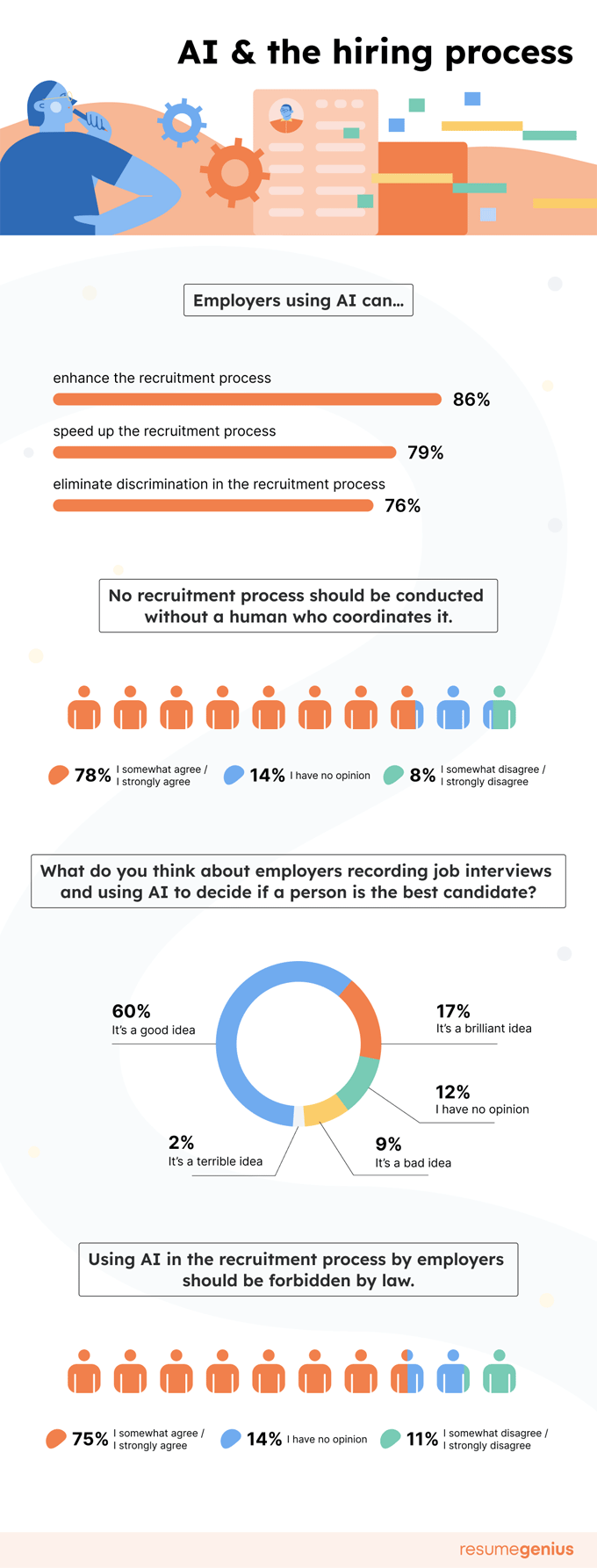
We collected opinions on using artificial intelligence in hiring. According to research participants, employers using AI could:
- enhance the recruitment process – 86% [hybrid of white and blue collar—96%, master’s degree holders—94%, earning $75,000 or more—93%]
- speed up the recruitment process – 79% [no college degree—64%]
- eliminate discrimination in the recruitment process – 76%
Although most respondents could see the benefits of AI in hiring, 78% believed that no recruitment process should be conducted without a human who coordinates it.
We also asked survey takers what they thought about employers recording job interviews and using AI to decide if a person is the best candidate. They answered as follows:
- It’s a brilliant idea – 17%
- It’s a good idea – 60%
- I have no opinion – 12%
- It’s a bad idea – 9%
- It’s a terrible idea – 2%
At the same time, 3 in 4 said using AI in the recruitment process by employers should be forbidden by law. This opinion is particularly popular among Democrats (82%) and health care workers (81%).
Using AI in the job search
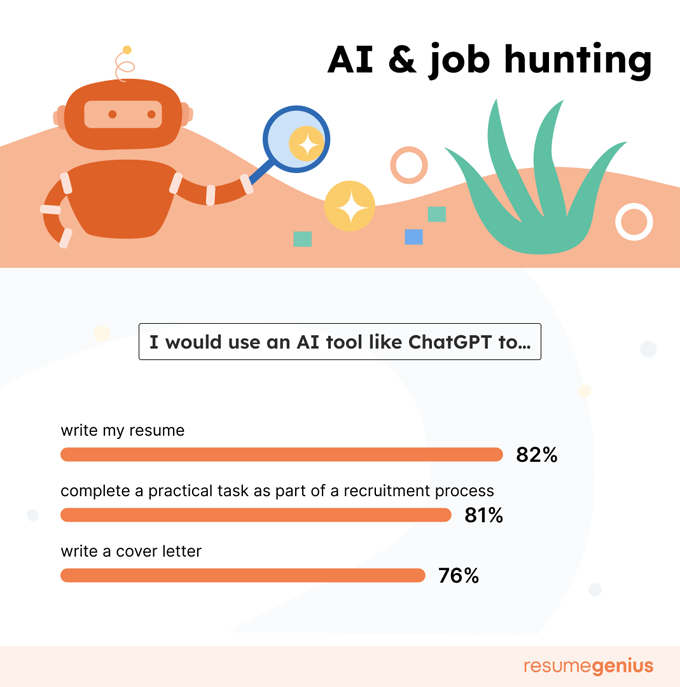
When it comes to job hunting, respondents claimed they’d be happy to use an AI tool like ChatGPT to:
- write a resume – 82% [master’s degree holders—73%]
- complete a practical task as part of a recruitment process – 81% [earning $25,000 or less—65%]
- write a cover letter – 76% [business & finance—87% vs. health care—68%]
Will AI take over the world?

Respondents were also asked to share their predictions for the future regarding AI development. They believe that AI technology will:
help large companies and corporations automate their business processes – 86%
- Work experience: 11+ years—89% vs. 1–2 years—79%
- Education: Master’s degree—90% vs. no college degree—72%
- Annual income: $75,000 or greater—93% vs. $25,000 or less—72%
lead to a more efficient and productive workplace – 80%
- Type of work: white collar—82% vs. blue collar—71%
- Work experience: 11+ years—88% vs. 1–2 years—77%
- Education: Master’s degree—83% vs. no college degree—65%
make human workers obsolete – 74%
- Industry: health care—81% vs. manufacturing—68%
- Type of work: white collar—75% vs. blue collar—66%
- Education: Master’s degree—80% vs. no college degree—64%
- Annual income: $75,000 or greater—83% vs. $25,000 or less—67%
help prevent discrimination and unequal treatment of workers – 73%
- Education: Master’s degree—85% vs. no college degree—64%
- Annual income: $75,000 or greater—78% vs. $25,000 or less—56%
- Political affiliation: Democrats—78% vs. Republicans—62%
Higher education level and higher income seem to go hand in hand with higher trust in the advantages of AI development. Meanwhile, those with lower incomes and a lower education level remain more skeptical.
Some more study findings to note:
- 79% of participants were of the opinion that AI technology would positively impact the overall job market.
- 73% thought that AI technology would positively impact the overall economy. Manufacturing industry employees were much more optimistic than those working in the health care sector (88% vs. 63%, respectively).
When asked how AI made them feel in the long term, respondents answered:
- The development of AI makes me feel excited about what the future brings – 39% [working for companies of 501+ employees—51%]
- The development of AI makes me feel worried about what the future brings – 27% [earning less than $25,000—41%]
- I feel neutral about the development of AI and its future consequences – 34%
84% of respondents claimed the development and use of AI by employees and employers should be guided by ethical principles.
These findings suggest that while workers believe that AI can be a useful tool, it should be used with caution.
Thoughts on artificial intelligence
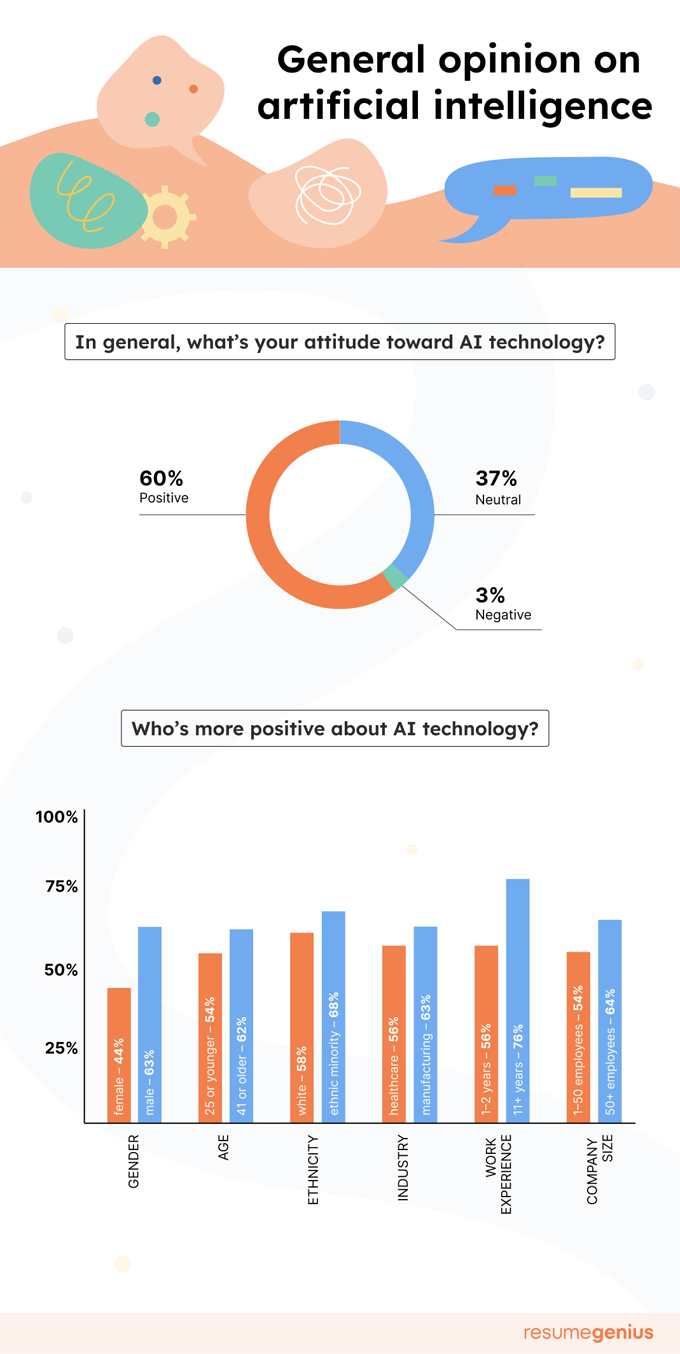
As for participants’ general opinion on artificial intelligence, 60% of the surveyed employees declared they had a positive attitude toward AI technology. However, that attitude isn’t always consistent. Let’s have a look at disparities within demographic groups to find out who is most positive about AI development.
- Gender: female—56% vs. male—63%
- Age: 25 or younger—54% vs. 41 or older—62%
- Ethnicity: white—58% vs. ethnic minority—68%
- Industry: health care—56% vs. manufacturing—63%
- Company size: 1–50 employees—54% vs. 501+ employees—64%
- Work experience: 1–2 years—56% vs. 11+ years—76%
As AI continues transforming the workplace, it’s important to remember that technology should serve us, not replace us. We must remain vigilant in ensuring that the benefits of AI are distributed equitably and that it does not exacerbate existing inequalities. Ultimately, the responsibility lies not with the machines but with the humans who design, implement, and regulate them*.
[*The final paragraph of the article was written by ChatGPT in response to the following prompt: “Write a few thought-provoking lines to put at the end of an article devoted to AI use in the workplace.” The rest of the article was 100% human written.]Methodology
The findings presented were obtained by surveying 994 respondents online via a bespoke polling tool. They were asked questions about artificial intelligence in the workplace. These included yes/no questions, scale-based questions relating to levels of agreement with a statement, questions that permitted the selection of multiple options from a list of potential answers, and a question that permitted open responses. All respondents included in the study passed an attention-check question.
Limitations
The data we are presenting rely on self-reports from respondents. Everyone who took our survey read and responded to each question without any research administration or interference. We acknowledge there are many potential issues with self-reported data, like selective memory, telescoping, attribution, or exaggeration.
Sources
- Built In, “Robots and AI Taking Over Jobs: What to Know About the Future of Jobs”
- Business Insider, “ChatGPT May Be Coming For Our Jobs. Here Are The 10 Roles That AI Is Most Likely To Replace”
- Exploding Topics, “57+ Amazing Artificial Intelligence Statistics (2023)”
- FishBowl, “ChatGPT Sees Strong Early Adoption In The Workplace”
- Forbes, “AI And You: How ChatGPT Can Take Your Career To The Next Level”
- Forbes, “How AI Will Impact The Future Of Work And Life”
- Forbes, “Only 1 In 10 Employees Use AI Skills At Work. Bosses Want To Change That”
- Forbes, “What Does ChatGPT Really Mean For Your Job?”
- Forbes, “Why ChatGPT Is About To Change How You Work, Like It Or Not”
- McKinsey & Company, “Generative AI Is Here: How Tools Like ChatGPT Could Change Your Business”
- McKinsey & Company, “The State Of AI In 2022—and A Half Decade In Review”
- Oracle & Future Workplace, “AI@Work Study 2019”
- Pew Research Center, “Public Awareness of Artificial Intelligence in Everyday Activities”
- PwC, “Automation Will Impact Around 30% of UK Jobs by Mid 2030s – But Which Ones?”
- Tidio, “Will AI Take Your Job? Fear of AI and AI Trends for 2023”
- Wall Street Journal, “AI in the Workplace Is Already Here. The First Battleground? Call Centers”
- Wall Street Journal, “What Is ChatGPT? What to Know About the AI Chatbot”
- Zapier, “How Does ChatGPT Work?”
- ZDNet, “6 Things ChatGPT Can’t Do (And Another 20 It Refuses To Do)”
About Resume Genius
Since 2009, Resume Genius has combined innovative technology with leading industry expertise to simplify the job hunt for people of all backgrounds and levels of experience.
Resume Genius’s easy-to-use resume builder and wide range of free career resources, including resume templates, cover letter samples, and resume writing guides, help job seekers find fulfilling work and reach their career goals. Resume Genius is led by a team of dedicated career advisors and HR experts and has been featured in The New York Times, Forbes, CNBC, and Business Insider.
For media inquiries, please contact us.
Click to rate this article
4.4 Average rating


